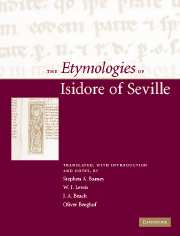Book contents
- Frontmatter
- Contents
- Acknowledgements
- Note to the Reader
- INTRODUCTION
- THE ETYMOLOGIES
- Analytical table of contents
- Book I Grammar (De grammatica)
- Book II Rhetoric and dialectic (De rhetorica et dialectica)
- Book III Mathematics (De mathematica)
- Book IV Medicine (De medicina)
- Book V Laws and times (De legibus et temporibus)
- Book VI Books and ecclesiastical offices (De libris et officiis ecclesiasticis)
- Book VII God, angels, and saints (De deo, angelis et sanctis)
- Book VIII The church and sects (De ecclesia et sectis)
- Book IX Languages, nations, reigns, the military, citizens, family relationships (De linguis, gentibus, regnis, militia, civibus, affinitatibus)
- Book X Vocabulary (De vocabulis)
- Book XI The human being and portents (De homine et portentis)
- Book XII Animals (De animalibus)
- Book XIII The cosmos and its parts (De mundo et partibus)
- Book XIV The earth and its parts (De terra et partibus)
- Book XV Buildings and fields (De aedificiis et agris)
- Book XVI Stones and metals (De lapidibus et metallis)
- Book XVII Rural matters (De rebus rusticis)
- Book XVIII War and games (De bello et ludis)
- Book XIX Ships, buildings, and clothing (De navibus aedificiis et vestibus)
- Book XX (Provisions and various implements)
- APPENDIX Correspondence of Isidore and Braulio
- INDEX
Book XI - The human being and portents (De homine et portentis)
Published online by Cambridge University Press: 22 September 2009
- Frontmatter
- Contents
- Acknowledgements
- Note to the Reader
- INTRODUCTION
- THE ETYMOLOGIES
- Analytical table of contents
- Book I Grammar (De grammatica)
- Book II Rhetoric and dialectic (De rhetorica et dialectica)
- Book III Mathematics (De mathematica)
- Book IV Medicine (De medicina)
- Book V Laws and times (De legibus et temporibus)
- Book VI Books and ecclesiastical offices (De libris et officiis ecclesiasticis)
- Book VII God, angels, and saints (De deo, angelis et sanctis)
- Book VIII The church and sects (De ecclesia et sectis)
- Book IX Languages, nations, reigns, the military, citizens, family relationships (De linguis, gentibus, regnis, militia, civibus, affinitatibus)
- Book X Vocabulary (De vocabulis)
- Book XI The human being and portents (De homine et portentis)
- Book XII Animals (De animalibus)
- Book XIII The cosmos and its parts (De mundo et partibus)
- Book XIV The earth and its parts (De terra et partibus)
- Book XV Buildings and fields (De aedificiis et agris)
- Book XVI Stones and metals (De lapidibus et metallis)
- Book XVII Rural matters (De rebus rusticis)
- Book XVIII War and games (De bello et ludis)
- Book XIX Ships, buildings, and clothing (De navibus aedificiis et vestibus)
- Book XX (Provisions and various implements)
- APPENDIX Correspondence of Isidore and Braulio
- INDEX
Summary
i. Human beings and their parts (De homine et partibus eius) 1. Nature (natura) is so called because it causes something to be born (nasci, ppl. natus), for it has the power of engendering and creating. Some people say that this is God, by whom all things have been created and exist. 2. Birth (genus) is named from generating (gignere, ppl. genitus), and the term is derived from ‘earth,’ from which all things are born, for in Greek ‘earth’ is called γῆ. 3. Life (vita) is named on account of its vigor (vigor) or because it holds the power (vis) of being born and growing. Whence even trees are said to possess life, because they are generated and grow. 4. Human beings (homo) are so named because they were made from the soil (humus), just as is [also] said in Genesis (cf. 2:7): “And God created man of the soil of the earth.” Incorrectly, the whole human is named from this term, that is, the whole human consisting of both substances, the association of soul and body. But strictly speaking, ‘human being’ is from ‘soil.’
5. The Greeks called the human being ἄνϑρωπος because he has been raised upright from the soil and looks upward in contemplation of his Creator (perhaps cf. ὤψ, “eye, face, countenance”). The poet Ovid describes this when he says (Met. 1.84):
While the rest of the stooping animals look at the ground, he gave the human an uplifted countenance, and ordered him to see the sky, and to raise his upturned face to the stars.
- Type
- Chapter
- Information
- The Etymologies of Isidore of Seville , pp. 231 - 246Publisher: Cambridge University PressPrint publication year: 2006

